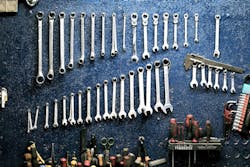Your Checklist for Kicking Off and Wrapping Up the Day
To some, an oil change or maintenance shop is just that, the place you take your car to get service done. Sadly, many people don’t know the difficulties of the day. It’s not easy telling someone a radiator hose or a starter motor is bad and they’ll need to fork over hundreds of dollars in parts and labor. We could talk all day about the differences car owners could make just for their own wallets, but that’s another talk for a different day.
When owning any business, it becomes very important to test out and implement various practices to make the day go by as smoothly as possible. A smooth opening and closing routine at a quick lube facility will provide a better place of business for customers and employees.
Keeping morale up amongst employees, while also dividing up a fair amount of tasks, is a way to ensure everyone puts in effort from to day to day.
“I’ll have little competitions — like sweeping races and customer satisfaction surveys — between the guys in the shop,” Jon Arthur of Arthur’s Autos told me in person one day. “I try to make everyone have a good time when we open and close. Sometimes if someone’s had a rough day, I usually let them go home early to get over it. No sense in having them stick around to put in half the effort.”
The more successful quick lubes have a number of employees split up tasks for opening the business. Have your lube techs turn on the air compressor, all of the fluids and guns, make sure the pit area is ready to go. A full-time technician will make sure all of the air and lights are on and working and set out inventory. The cashier needs to check the money in the register both in the morning and at night, making sure everything adds up to the previous amount documented. A manager or the finance officer will handle the daily paperwork and books.
If your shop employs someone to pick up and drop off clients, make sure he or she checks the vehicle they use. That car, especially, has to be in the best shape possible — interior, engine, tires and brakes — all need to be kept up to a top standard, even if it’s an old van. This is one of the first lines of defense in showing your customers how much you value their business.
Closing means the staff is ready to go home, but only after they know all of their duties have been fulfilled. Are the cars still needing or in service locked? Where are the keys? Hopefully you have a safe or a key lock. Shut down the fluids, air compressor, make sure all red (oil) towels are in a fireproof container, lock the bay door(s), take out the trash and make sure all next day cash is locked away.
Tanner Wilkins of Kwik Kar Automotive said smiling and enjoying the day is key, “even when it’s 105 heat index in the shop, the customer can look out and feel more at ease that we are happy with what we are doing.” It’s simple, sure, but always effective.
Most of the garage managers I spoke with told me the practices of opening and closing are pretty simple; from making sure there’s money in the cash register every morning, turning on the lights and fluids, and sweeping up throughout the day, making sure all the keys to cars still in service are locked up at night, and then locking up and going home.
But it’s more about how well everything is put into effect. You need to be able to open and close exactly the same every day and night without fail. And don’t forget to do a little cleaning up during the off-times of the day.
While it may seem simple, there are times when life goes differently than planned.
“Last night, we had tornadoes and hail here,” Wilkins said. “When I heard the tornado sirens, we started getting cars inside the building, taking down signs and the flag.”
Have you accounted for closing techniques to ensure the safety of your employees and customers? It seems like an odd thought, but since Wilkins’ family owned and operated business is in Kansas City, Missouri, smack dab in the middle of tornado alley, it’s a smart for him to have protocols in place.
How will your business close up for the day or night when a tornado, flash flood or other type of inclement weather happens?
Many successful quick lubes try to have regular meetings with their employees. To do this means you are completely committed to the overall day-to-day functions and have a hands-on attitude. Managers, owners and technicians said this creates a bond and a relationship where employees are less afraid to voice their opinions about how the business can do better and grow.
